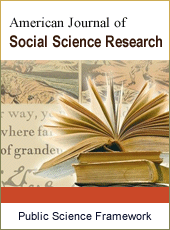American Journal of Social Science Research
Articles Information
American Journal of Social Science Research, Vol.5, No.1, Mar. 2019, Pub. Date: Feb. 28, 2020
Awareness of the Small Scale Holders to the Post-Harvest of Sorghum: Evidences from Tokar, Eastern Sudan
Pages: 10-18 Views: 1833 Downloads: 400
[01]
Abdelateif Hassan Ibrahim, Deparment of Agricultural Economics, University of Khartoum, Khartoum, Sudan.
[02]
Abdel Ghani Ismail Omar, Agricltural Research Cooperation, Al-Jenina, Sudan.
[03]
Mohmed Musa Ali Ibrahim, International Committee of the Red Cross, Nyalla, Sudan.
The study aim to investigate the Small Scale Holders on the knowledge and skills on the post-harvest operational management and to describe the aspect of post-harvest losses and management of sorghum in Western Sudan Tokar locality. The paper depends on the secondary data sources including record and documents from the Ministry of Agriculture of Sudan. The primary data were collected through structured questionnaires of randomize sampling techniques. A total sample of 62 Small Scale Holders of farmers (39 male and 23 female) had been interviewed on the knowledge and aspects of the post-harvest losses. A set of research tool including descriptive statistic, frequency distribution and customs table were used. The results revealed the aspect of farmer do not understand the grain quality and grade of; adequate, good, poor, excellent and very poor were 29%, 24%, 18%, 16% and 13% respectively. While for the grain damage during threshing/shelling and various options threshing; were adequate, good, poor, very poor and excellent with 33%, 24%, 18%, 14% and only 11% respectively. They did not understand how to dry the sorghum without contamination or damage, sundry, using the plastic sheets were 30% adequate, 26% poor, 20% very poor and only the smallest proportion of 9% as excellent. Moreover, they did not know the moisture content in sorghum were 33% poor, 29% adequate, 17.5% very poor, 12% good and only 8.5 were excellent. For the grain storage and facilities were 35% as poor, 27% very poor, 22% adequate, 9% good and only the smallest number of 7% as excellent. Findings from this study is recommend more attention and the research direction should be farmers on training sessions and capacity building; this could be possible through to the so called (FFSs) and to increase the knowledge and skills of the small scale farmers as well as to improve post-harvest losses of grain quantities, quality and the overall of the food security.
Post-Harvest Losses and Management, Sorghum and Millet Losses, Losses to the Food Security
[01]
ACF, [2014]. POST-HARVEST LOSSES AND STRATIGIES TO REDUCT THEM.
[02]
APHLS, [2014]. AFRICAN POST HARVEST LOSSESS INFORMATION SYSTEM.
[03]
Adebayo B. Abass et al, [2013]. Post –Harvest Food Losses in maize –based farming system of semi-arid savannah Area of Tanzania.
[04]
Aloka Kumari and Pranay Punj Pankaj, [2012]. Post –Harvest Losses of Agricultural Product: Management and Future Challenges in Inida.
[05]
Deepak Kumar and Prasanta., [2017]. Reducing Post –Harvest Losses during Storage of Grain Crops to Strengthen Food Security in Developing Countries.
[06]
ECONOMIC OF AGRICLTURAL DEVELOPMENT [2ND EDITION, 2010]. LONDON AND NEW YOURK.
[07]
Ezzedine Boutrif. [2010]. Designing Integrated Public Policies for Food Security and Safety: modern concept and approach.
[08]
FAO, WFP and Ministry of Agriculture [2017]. Post -Harvest Analysis. Sudan.
[09]
H. Hengsdijk, [2017]. Post-harvest management and post-harvest losses of cereals in Ethiopia.
[10]
HIPPOLYTE et al, [2015]. Unpacking Post-harvest Losses in Sub-Saharan Africa.
[11]
H., Basavaraja et al, [2007]. Economic Analysis of post-harvest Losses in Food Grain in India.
[12]
ICRC, [2014]. Post-Harvest Assessment East Jabel Marra, Darfur Sudan.
[13]
Ministry of Agriculture and Irrigation [MoAIs, 2017]; Red Sea: Post-Harvest Assessments (PHAs) Sudan.
[14]
M, M. Ali and Suleiman Hassan Suleiman, [2015]. ICRC Post-Harvest Assessment Darfur, Sudan.
[15]
Mahgoub Suliman et al, [2015]. Mesquite Risk Mapping and Assessment in Tokar Delta-Eastern Sudan.
[16]
RICHARD L. KOHLS and JOSEPH N. NHL; Purdue University, Marketing of AGRICLTURAL PRODUCTS, [9TH EDITION, 2002], New Jersey.
[17]
UNIDO, [2009]. Farmers Training Manual on Post-Harvest Management of Sorghum, Groundnut and Maize.

ISSN Print: 2381-7712
ISSN Online: 2381-7720
Current Issue:
Vol. 7, Issue 3, September Submit a Manuscript Join Editorial Board Join Reviewer Team
ISSN Online: 2381-7720
Current Issue:
Vol. 7, Issue 3, September Submit a Manuscript Join Editorial Board Join Reviewer Team
| About This Journal |
| All Issues |
| Open Access |
| Indexing |
| Payment Information |
| Author Guidelines |
| Review Process |
| Publication Ethics |
| Editorial Board |
| Peer Reviewers |


